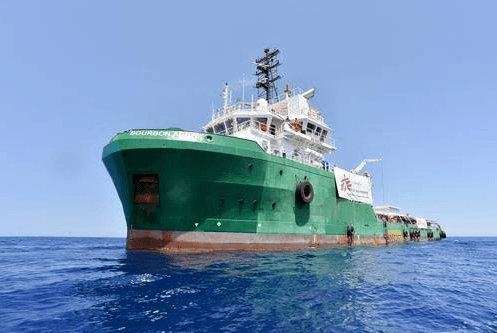Dr. Al-Tikriti travels worldwide, brings adventure and advice to classroom
3 min read
Julie Remy | MSF
By HANNAH GALEONE
Over the summer, one of UMW’s Associate History Professor, Dr. Nabil Al-Tikriti traveled to Libya to be a cultural facilitator and mediator aboard the Doctors Without Borders Médecins Sans Frontières or MSF ship, Bourbon Argos. The vessel saved more than 1,000 refugees during his stay.
Al-Titriki has worked with Doctors Without Borders “off and on since 1993.” Doctors Without Borders was founded in December of 1971 and started off with a staff of 300 volunteers who were doctors, nurses and journalists.
Now, after years of growth and expansion, MSF has offices in 28 countries, employs over 30,000 people worldwide and has treated more than 100 million patients. In 2014 alone, 8.25 million outpatient consultations were carried out.
According to the Doctors Without Borders website, the group was created on the belief that “all people have the right to medical care regardless of gender, race, religion, creed, or political affiliation, and that the needs of these people outweigh respect for national boundaries.”
Generally, the individuals they were rescuing were people trying to reach Europe using a small or improvised watercraft. The experiences that the volunteers and doctors aboard these vessels gain is extremely powerful. Twitter, for instance, has become a platform that MSF volunteers use to share their feelings about their work. Dr. Erna, an MSF volunteer, tweeted that “[he] used to love the sea. But [he] will never look at it the same way again.”
An MSF nurse named MJ tweeted his observation that “People are grateful to have a safe place to sleep, for many it is the first time in years.”
Then, about a month ago, Al-Titriki traveled to Belarus, located in Eastern Europe, where he worked as a monitor during the presidential election. What struck Al-Tikriti were the differences between the Belarusian elections and elections in the United States.
“Their[s] are quite different than US elections, and there were quite a few election improprieties much of which is due to their having a strong authoritarian government,” Al-Tikriti said. Al-Tikriti has brought what he has learned from traveling around the world into the UMW classroom, particularly in his “History of Genocide” Freshmen Seminar (FSEM). According to Al-Tikriti, the seminar is influenced by a lot of his MSF experiences.
Al-Tikriti encourages students to “keep up with events in the Middle East” and his first advice to do so would be to “study a Middle Eastern language, study abroad, and make connections in the region itself by spending at least a semester living in the region.” He also advises students to challenge their prior beliefs.
“Once you [engage in a culture,] you’ll be surprised at how many things you thought you knew about the region turned out to be inaccurate. Once you have made friends in the region and learned a language, you’ll then know how to evaluate and follow events far more astutely.”
Al-Tikriti has spent a good part of the year doing just that, and he hopes to give students the same appreciation and desire to learn and explore different cultures that he has.











